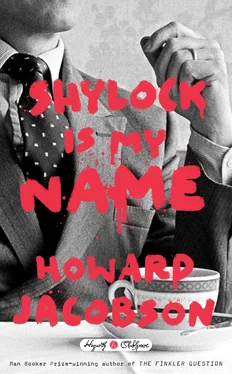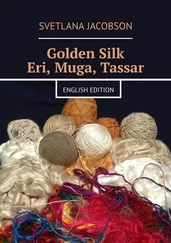If the project was going to elicit so little in the way of interest and curiosity as to constitute no disturbance to the environment whatsoever, D’Anton, looking tragic, argued, then where was the advantage to the local community in supporting it? As for the fact that the odd obscure artist whose work would hang in the Morris and Leah Strulovitch Gallery of Jewish Art hailed from the area, that was an argument that could be adduced to support any venture. If he, for example, wanted to build a Museum of Sadism and Torture in North Cheshire, would it advance his cause to show that a number of the perverts featured came from the Wilmslow or Alderley Edge area?
Strulovitch reminded council officers that the works on display would cost the local rate-payers nothing, that they were a gift from him to them, and that furthermore there was no similarity, from a cultural or educative point of view, between an art gallery and a chamber of horrors. D’Anton wondered from whose cultural point of view Mr. Strulovitch was speaking. He could, to be frank about it, imagine many who lived in the Golden Triangle finding more to entertain and instruct them in such a venue as he had humorously conjured out of the air than in that presented with so much heat, aforethought and condescension by the applicant. What evidence indeed was there that there’d be any interest at all in a gallery of Jewish art, British or otherwise — most of which, as he understood the matter, was urban and avant-garde in spirit — in a rural area of outstanding natural beauty with its long history of quiet churchgoing? He wasn’t arguing against the existence of such art — he was something of an avant-gardist himself — nor was he averse, in principle, to such a venture as Mr. Strulovitch proposed. He didn’t doubt that in a more culturally apt place, by which Strulovitch took him to mean Golders Green or the Negev, it would be welcomed. But why, in the name of God, a Morris and Leah Strulovitch Gallery of Jewish art, here ?
Strulovitch, who didn’t like the way D’Anton enunciated his parents’ names, saw his proposal turn putrid. It hung in the air of the council chamber like a malign presence. As D’Anton talked it even took a form, an incubus that would disturb the quiet of the Golden Triangle by day, and the sleep of its inhabitants by night. Strulovitch could feel its touch, smell it, taste it. He wished he could withdraw all memory of it, in order to spare his parents’ very names the stench of alien malevolence with which they were now associated. But there was no reversing the ancient imputation of interloperie that D’Anton had, with such expertness, laid upon them. Morris and Leah Strulovitch —why, even he, the son, was ready to run from such an incantation of evil. Morris and Leah Strulovitch —stand on the highest point of Alderley Edge under a full moon and say the names three times and hell itself would open.
As happens when you make an enemy of someone you have never previously met, though you are neighbours, Strulovitch now began to run into D’Anton everywhere — in restaurants in the Golden Triangle, at charitable dinners, at parties thrown by wealthy art collectors, at a concert in the Bridgewater Hall in Manchester, even at a Society of Watercolourists’ reception in London. Am I imagining him, Strulovitch wondered. Am I conjuring him up out of the hatred we bear each other? He was careful never to meet his eye and felt confident that D’Anton was no more eager to meet his.
What’s happening to me, Strulovitch wondered. Was he turning into one of those Jews who saw insults to his Jewishness everywhere? God forbid. Such a person only insulted himself. Weren’t there plenty of non-Jews he didn’t like? I will not behave like this, he promised himself. I will not allow myself to feel slighted by the rustlings of a mouse.
And when the mouse was malignant? A malignant, moping, misanthropic mamzer of a mouse? To his rustlings, too, would Strulovitch cultivate a fine Anglo-Saxon indifference.
But one day as he was strolling through Knutsford after a long lunch with an old barrister friend who had chambers in the town, Strulovitch found himself at the edge of a small but ill-tempered demonstration outside the town hall, the object of which, he deduced from the literature being handed out, was a company that had a contract to recycle waste for the local council, but that also made parts for a pipeline that linked illegal settlements on the West Bank with Tel Aviv.
“So the purpose of this demonstration is what?” Strulovitch asked one of the protestors.
“To persuade the council to cancel the contract.”
“For the pipeline in the West Bank?”
“For the rubbish and recycling services here.”
“Here in Knutsford?”
“Yes.”
“So what will happen to our rubbish?”
“There are others who can collect it. And anyway what’s a little inconvenience…?”
“No, exactly,” Strulovitch agreed. But he wasn’t sure how inconvenience to the people of Cheshire would impact detrimentally on a pipeline to and from the illegal settlements in the West Bank.
The protestor helped him out. “You make a noise where you can,” he said.
“Hoping that it will reverberate…?”
“Eventually, yes.”
When a butterfly beats its wings in Knutsford, Strulovitch was thinking…then he spotted D’Anton moving quietly among the demonstrators. There was no time to make a decision one way or another, or remember what he’d promised himself. He simply acted out of impulse. “Hello there,” he called out, and when D’Anton turned, Strulovitch waved at him.
D’Anton also had no time to think. Perhaps he too had vowed never to acknowledge Strulovitch — though he had no reason to think of himself as an aggrieved party — or, to the contrary, promised himself never to be offended by who or what Strulovitch was, but caught like this he could only nod an automatic greeting in return.
“A noisy gathering for our quiet county,” Strulovitch said.
D’Anton turned his sad eyes away.
“Would you say,” Strulovitch continued, “that this is a cause intrinsic to the area?” And when this time D’Anton turned his back, Strulovitch repeated the question in a voice that even to his own ear constituted a violent demonstration in itself. “Culturally, is all I’m asking. Culturally, would you say that this engages the interests of the local rate-payer, honours the area’s long-standing history of gentle churchgoing, keeps the peace and respects the quiet — in a way that, say…”
But D’Anton was gone, lost among his fellow demonstrators.
Later, sitting alone in his garden, watching shadows dance like devils over Alderley Edge, and wishing he had a wife he could consult, or a daughter that wasn’t out French-kissing troglodytes, Strulovitch wondered whether he was glad or sorry he hadn’t emptied his stomach of all the bile it contained and called D’Anton what he believed him — no, what he knew him — to be.
Both, he decided.
Sorry, because the bile needed to go somewhere, and D’Anton deserved to be called the thing he was.
Glad, because the accusation he wanted to hurl at D’Anton’s retreating back was of a sort that always returned to wound the thrower. How, sociopathologically, it had become a foul to cry foul, Strulovitch didn’t know. But that was the state of things. No longer was it the hater who was unhinged; the real madman was the person who believed himself to be hated. Better, Strulovitch thought, when our enemies wore their loathing on their sleeves, called us misbelievers, infidels, inexecrable dogs, whipped us, kicked us, dishonoured, disempowered, dispossessed us, but at least didn’t deliver the final insult of accusing us of paranoia. See how the dog returns to the vomit of his self-pity, happy only when he thinks we wish him to perdition.
Читать дальше












